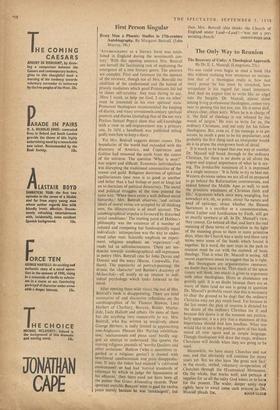First Person Singular
`AUTOBIOGRAPHY as a literary form was estab- lished in England during the seventeenth cen- tury.' With this opening sentence Mrs. Bottrall sets herself the fascinating task of explaining the emergence of a new literary genre. The answers are complex. First and foremost (in the opinion of the reviewer, though not of Mrs. Bottrall) the abolition of the confessional and the hatred of priestly mediators which good Protestants felt led to Closer self-scrutiny. Any man daring to say, `Here I stand, so help me God, I can no other' must be interested in his own spiritual state. Protestant theologians recommended the keeping of diaries, and many seventeenth-century spiritual journals and diaries (including that of the not very Puritan Samuel Pepys) show that self-knowledge with a view to self-improvement was a primary aim. In 1656 a handbook was published telling godly men how to keep a diary.
Yet Mrs. Bottrall suggests deeper causes. The boundaries of the world had expanded with the discovery of America, and Copernicus and Galileo had removed the earth from the centre of the universe. The question 'What is man?' was urgent and difficult. Economic individualism was disrupting the traditional communities of the manor and guild. Religious doctrines of spiritual egalitarianism (one man is as good as another and better than a bad bishop or peer or king) led on to doctrines of political democracy. The social and political struggles of the time pointed the same way. 'When there exists a well-defined social hierarchy,' Mrs. Bottrall observes, 'and certain ideals of moral virtue are accepted by all thinking men, the idiosyncratic is of small account. The autobiographical impulse is favoured by disturbed social conditions.' The starting point of Hobbes's philosophy was the existence of a number of isolated and competing but fundamentally equal individuals : introspection was the way to under- stand other men. Scientific emphasis on experi- ment, religious emphasis on 'experience'—all roads led to selfconsciousness. There are ten- dencies towards autobiographical self-expression in poetry (Mrs. Bottrall cites Sir John Davies and Donne) and the essay (Bacon, Cornwallis, Fel- tham). The popularity of portrait-painting; the drama, the 'character' and Burton's Anatomy of Melancholy—all testify to an interest in indi- vidual psychology which looks. forward to the novel.
After opening these wide vistas, the rest of Mrs. Bottrall's book is disappointing. There are brief summaries of and discursive reflections on the autobiographies of Sir Thomas Browne, Lord Herbert of Cherbury, •Bunyan, Baxter, Martin- dale, Lady Halkett and others. On none of them has she anything very memorable to say. Mrs. Bottrall, who has written so sensitively about George Herbert, is sadly limited in approaching non-Anglicans. Phrases like 'Puritan exhibition- ism,' unctuousness and pious cant' hardly sug- gest an attempt to understand. She ignores the moving religious journals of 'worthy Quakers and other sectarians.' Bunyan ('who is sometimes re- garded as a religious genius') is treated with bewildered condescension and prim disapproba- tion. If only the tinker had enjoyed 'a cultivated environment' or had had 'normal standards of reference by which to judge the heinousness of his offences,' then there need not have been all the pother that Grace Abounding records. 'Poor ignorant unstable Bunyan' went to gaol for twelve years merely because he was 'intransigent'; but then Mrs. Bottrall also thinks the Church of England under Laud—Laud! =was not a per-


































 Previous page
Previous page